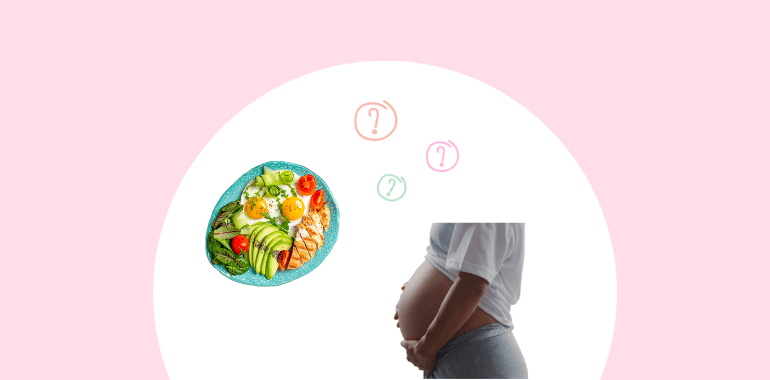Table Of Contents
What is Intermittent Fasting, and How Does it Work?
Intermittent fasting is a dietary pattern that involves cycling between periods of fasting and eating. There are several methods of intermittent fasting, but the most common include:
➙ Time-restricted eating: 16/8 intermittent fasting while breastfeeding involves eating only during a specific time window each day, typically 8-10 hours, and fasting for the remaining 14-16 hours.
➙ Alternate-day fasting: This involves alternating between days of normal eating and days where you eat very few calories (500-600 calories).
➙ 5:2 diet: This involves eating normally for 5 days out of the week and restricting calories to 500-600 for the other 2 days.
During fasting, the body is forced to use stored energy (glycogen and fat) for fuel, as it is not receiving any new power from food. This leads to a reduction in insulin levels and an increase in growth hormone, which promotes fat-burning and muscle growth.
Additionally, intermittent fasting has been shown to improve blood sugar control, reduce inflammation, and increase cellular repair processes in the body. Overall, intermittent fasting can be an effective tool for weight loss and improving overall health. Still, working with a healthcare professional must ensure it is safe and appropriate for your individual needs.

Can You Do Intermittent Fasting While Breastfeeding? – Thoughts of Experts
Intermittent fasting while breastfeeding can be a controversial topic, as there is limited research on the safety and potential effects on milk supply and infant health.
According to experts, when done responsibly, intermittent fasting can be well-tolerated while breastfeeding. However, a study conducted by the University of Southern California found that fasting longer than 24 hours was excessive and could lead to a low milk supply. Therefore, breastfeeding women should consult with their healthcare provider to find the best approach based on their needs and situation.
This may include something as simple as spacing meals out more so they are not eating late in the evening or overnight. But ultimately, what matters most is that mothers have enough energy and calories to produce adequate breast milk for their infants.
Some experts suggest that it may be safe for some intermittent fasting postpartum, particularly if they have a stable milk supply and do not experience any adverse symptoms such as reduced milk production, dizziness, or fatigue.
- However, it’s important to note that fasting for long periods or restricting calorie intake too severely can harm both the mother and infant and may lead to a reduction in milk production or inadequate nutrient intake.
Other experts advise against intermittent fasting while breastfeeding, particularly during the first few months when milk production is still being established. Instead, they recommend focusing on a balanced diet that provides adequate nutrients for both the mother and the infant.
Ultimately, it’s essential to work with a healthcare provider or a registered dietitian knowledgeable about breastfeeding and intermittent fasting to determine whether it is appropriate and safe for you to try.
Suppose you do choose to practice intermittent fasting while breastfeeding. In that case, monitoring your milk supply and consulting with a healthcare provider if you experience any negative symptoms or concerns is crucial.
Is Intermittent Fasting Safe During Pregnancy?
Intermittent fasting during pregnancy is not recommended, as it can risk both the mother and the developing fetus.
Pregnancy is a critical period of growth and development, and the fetus requires a constant and adequate supply of nutrients to support healthy development. However, intermittent fasting, which involves restricting calorie intake or fasting for extended periods, can reduce the intake of essential nutrients critical for fetal development, such as folate, iron, and calcium.
Additionally, fasting may increase the risk of low birth weight, preterm labor, and other complications during pregnancy.
However, there are some instances where light fasting may be beneficial, such as for pregnant women who have severe morning sickness or those on a vegan diet with limited food options.
Furthermore, in any instance where a woman does choose to fast intermittently, she must eat enough healthy food when she does eat to ensure that her nutritional needs and those of her baby are met.
Pregnant women must focus on a balanced and varied diet that provides the necessary nutrients for the developing fetus. It’s also essential to work with a healthcare provider or a registered dietitian to develop a personalized nutrition plan that meets the individual needs of the mother and the growing fetus.

The Pros & Cons of Intermittent Fasting While Pregnant
Intermittent fasting is generally not recommended during pregnancy due to the potential risks it poses to both the mother and the developing fetus. However, here are some pros and cons to consider:
Pros:
There are no known pros of practicing intermittent fasting while pregnant, as it is generally not recommended due to the potential risks it poses to the mother and the developing fetus.
Pregnancy is a critical period of growth and development, and the developing fetus requires a constant and adequate supply of nutrients to support healthy development. Fasting or restricting calorie intake during intermittent fasting while breastfeeding results can reduce the intake of essential nutrients, such as folic acid, iron, and calcium, critical for fetal growth and development.
Cons:
- Reduced intake of essential nutrients: Fasting or severely restricting calorie intake during pregnancy can reduce the intake of essential nutrients, such as folic acid, iron, and calcium, critical for fetal growth and development.
- Risk of dehydration: Fasting can increase the risk of dehydration, which is a concern during pregnancy as dehydration can cause complications such as preterm labor.
- Risk of hypoglycemia: Fasting can also increase the risk of hypoglycemia (low blood sugar), which can be dangerous for the mother and fetus.
- Possible impact on milk supply: Intermittent fasting during breastfeeding can impact milk supply, which can affect the infant’s health and nutrition.
Overall, it’s important to prioritize a balanced and varied diet during pregnancy and to work with a healthcare provider or a registered dietitian to develop a personalized nutrition plan that meets the needs of both the mother and the growing fetus.
Keto and Breastfeeding: Safety and Side Effects
While the keto diet may be safe for some breastfeeding mothers, it’s essential to approach this type of diet cautiously and under the guidance of a healthcare professional.
- Breastfeeding can be challenging for mothers to navigate in terms of the health and safety of their babies. The ketogenic diet, or ‘keto,’ is a low-carbohydrate, high-fat diet that’s becoming increasingly popular among breastfeeding women. Though keto has many potential benefits in terms of weight loss and well-being, it is essential to note that this diet has specific possible side effects that breastfeeding mothers should consider carefully.
Clinical trials indicate that there could be some negative consequences on cognitive development, including stunted growth potential when a child is exposed to a high-fat diet too soon; however, the majority of analysis reveals no discernible difference.
Therefore, most doctors will agree that following the ketogenic diet while breastfeeding is generally safe but should be monitored closely by your physician or lactation consultant.
Ultimately, any dietary change during this time should be thoroughly evaluated by the mother and her healthcare provider before being implemented into her daily routine.
Here are some safety considerations and potential side effects of keto and intermittent fasting while breastfeeding to keep in mind:
- Adequate calorie intake: Breastfeeding requires a significant amount of energy and can increase calorie needs, so it’s important for breastfeeding mothers on the keto diet to ensure that they are consuming enough calories to support both their own needs and milk production.
- Sufficient nutrient intake: The keto diet can be low in specific nutrients, such as fiber, vitamins, and minerals. Breastfeeding mothers need to ensure that they consume sufficient nutrients to support their babies’ nutritional needs.
- Risk of dehydration: The keto diet can dehydrate, which is a particular concern during breastfeeding, as dehydration can impact milk production and quality.
Potential side effects
- Low milk supply
The keto diet may reduce the milk supply in some women. This is thought to be related to the reduction in carbohydrate intake, which can impact hormone levels that are important for milk production.
- Changes in milk composition
The keto diet can also impact the composition of breast milk, as the body may switch to using ketones as a source of energy instead of glucose. This can potentially affect the nutritional content of the milk.
- Potential impact on infant health
There is limited research on the impact of the keto diet on infant health during breastfeeding. While some studies suggest that a keto diet may be safe, others suggest that it may negatively impact infant growth and development.
5 Best Practices for Fasting While Breastfeeding
If you’re considering fasting while breastfeeding, it’s important to follow some best practices to ensure that you and your baby stay healthy. Here are five best practices to keep in mind:
First, consult with a healthcare professional.
Before starting any type of fasting regimen, it’s important to consult with a healthcare professional, such as your doctor or a registered dietitian, to discuss whether fasting is appropriate for you and your baby.
Choose a safe and appropriate fasting method.
There are many different types of fasting, and not all are appropriate or safe for breastfeeding mothers. For example, very low-calorie or water-only fasts are generally not recommended. Instead, consider a mild form of intermittent fasting, such as a 12-14 hour overnight fast or a modified fast that includes some food.
Monitor your milk supply.
Keep an eye on your milk supply and watch for any changes that may indicate that your fasting regimen is impacting your milk production. If you notice a decrease in your milk supply, consider adjusting your fasting schedule or consulting with a healthcare professional.
Stay hydrated.
It’s important to stay well-hydrated while fasting, especially while breastfeeding. Be sure to drink plenty of water and other fluids throughout the day to prevent dehydration.
Listen to your body.
Pay attention to how your body feels while fasting and adjust your regimen accordingly. For example, if you feel dizzy, lightheaded, or fatigued, it may be a sign that you need to eat something. However, don’t push yourself too hard; always put your and your baby’s health first.
How to Do Intermittent Fasting While Breastfeeding: 10 General Rules
Intermittent fasting while breastfeeding requires careful consideration to ensure that both you and your baby stay healthy. Here are 10 general rules to follow:
- Start slowly: It’s important to ease into intermittent fasting gradually. Begin with a 12-14 hour overnight fast and progressively increase the duration over time.
- Focus on nutrient-dense foods: When you do eat, focus on nutrient-dense foods that will provide you and your baby with the nutrients you need. Include plenty of protein, healthy fats, and fruits and vegetables in your diet.
- Stay hydrated: Drink plenty of water and other fluids throughout the day to stay well-hydrated.
- Don’t skip meals: While fasting, it’s crucial to eat still enough to provide your body with the energy it needs. So don’t skip meals or drastically reduce your calorie intake.
- Monitor your milk supply: Keep an eye on your milk supply and watch for any changes that may indicate that your fasting regimen is impacting your milk production. If you notice a decrease in your milk supply, consider adjusting your fasting schedule or consulting with a healthcare professional.
- Be aware of your baby’s hunger cues: If your baby is showing signs of hunger, it’s important to respond to their needs and feed them, even if it falls outside your fasting window.
- Listen to your body: Pay attention to how your body feels while fasting and adjust your regimen accordingly. If you feel dizzy, lightheaded, or fatigued, it may be a sign that you need to eat something.
- Avoid extreme fasting methods: Very low-calorie or water-only fasts are generally not recommended while breastfeeding.
- Get enough sleep: Getting enough sleep is important for overall health and can help support milk production.
- Consult with a healthcare professional: Before starting any type of fasting regimen, it’s important to consult with a healthcare professional, such as your doctor or a registered dietitian, to discuss whether fasting is appropriate for you and your baby.
Intermittent Fasting and Breastfeeding: How to Modify Your Diet to Get Enough Nutrients
Intermittent fasting and breastfeeding can be a challenging combination. As a breastfeeding mom, you need to ensure that you are eating the right food to meet the nutrient needs of both yourself and your baby.
The key to this is modifying your diet so that you are getting enough of the daily recommended intake for both calories and vital nutrients. To do this, try focusing on high-energy and nutrient-dense foods such as nuts and legumes, whole grains, low-fat dairy, lean meats, fruits, and vegetables.
Also, look into supplementation options as necessary to increase iron levels or B12 if needed. Enlisting professional advice from a registered nutritionist can help guide decisions around calorie intake and optimal nutrition while intermittent fasting while breastfeeding.
If you’re practicing intermittent fasting while breastfeeding, it’s vital to ensure that you still get all the nutrients you and your baby need. Here are some tips to help you modify your diet:
- Focus on nutrient-dense foods. When you do eat, focus on nutrient-dense foods that will provide you and your baby with the nutrients you need. This includes plenty of protein, healthy fats, and fruits and vegetables.
- Eat enough during your feeding window. While fasting, it’s essential to eat still sufficient to provide your body with the energy it needs. So make sure to eat enough during your feeding window to meet your calorie and nutrient needs.
- Incorporate a variety of foods. To ensure that you get a wide range of nutrients, try to incorporate various foods into your diet. This can include fruits, vegetables, whole grains, lean proteins, and healthy fats.
- Consider a multivitamin. While it’s always best to get your nutrients from whole foods, a multivitamin can help ensure that you meet your nutrient needs.
- Stay hydrated. Drink plenty of water and fluids throughout the day to stay well-hydrated.
- Avoid processed foods. While intermittent fasting, avoiding processed foods, and focusing on whole, nutrient-dense foods are essential.
Also, read – The Most Inspiring Fasting Weight Loss Success Stories
Intermittent Fasting While Nursing: Best & Worst Eating Choices
Suppose you’re practicing intermittent fasting while nursing. It’s essential to make healthy food choices during your feeding window to ensure that you and your baby get the nutrients you need. Here are some best and worst eating choices for intermittent fasting while nursing:
Best Eating Choices
- Lean proteins
Chicken, fish, turkey, and tofu can provide you and your baby with essential amino acids for growth and repair.
- Healthy fats
Avocados, nuts, and seeds can provide healthy fats that can boost your energy and maintain your milk supply.
- Fiber-rich vegetables
Spinach, broccoli, and carrots can provide essential vitamins, minerals, and fiber to support digestive health.
- Whole grains
Oats, quinoa, and brown rice can provide energy and help stabilize blood sugar levels.
- Low-sugar fruits
Berries, apples, and pears can provide essential vitamins, minerals, and fiber with less sugar than other fruits.
Worst Eating Choices Intermittent Fasting Postpartum
- Processed foods
Foods that are high in sugar, salt, and unhealthy fats, such as fast food and packaged snacks, can negatively impact your milk supply and overall health.
- Caffeine and alcohol
Both can interfere with milk production and should be consumed in moderation or avoided entirely.
- High-sugar fruits and fruit juices
These can lead to blood sugar spikes and crashes and may also be high in calories.
- Dairy products
Some nursing mothers may be sensitive to dairy, which can cause digestive issues for their babies.
- Spicy or gassy foods
These can cause discomfort for some babies, so it may be best to avoid them or eat them in moderation.
- High-sugar desserts
Foods like cakes, cookies, and ice cream are high in sugar and calories and should be avoided or consumed in moderation.
- Fried foods
Fried foods are often high in unhealthy fats and can negatively impact your overall health.
- Processed meats
Foods like deli meats and sausages are often high in sodium and unhealthy fats and can negatively impact your health.
- High-sodium foods
Foods that are high in sodium, such as canned soups and frozen dinners, can negatively impact your health and milk supply.
- Low-nutrient foods
Foods that are low in nutrients, such as candy and chips, can negatively impact your health and milk supply.
Also, read – Fasting and Libido: The Surprising Effects
Conclusion
In conclusion, the general question is: is intermittent fasting safe while breastfeeding? It is a difficult but doable feat. It has its fair share of struggles, but the potential rewards are abundant. As a nursing mother, try to stay committed to a moderate eating plan and fitness regime that works for you and your baby.
Listen to your body and adjust as needed. If something isn’t feeling right, refer to your healthcare provider for professional help. Being mindful of what nourishes your body can be beneficial both physically and mentally.
Remember: along this path of motherhood, take time to nourish yourself most importantly!
In the end, make sure that you are giving care and attention to yourself, as it is equally important as taking care of your baby.
My name is Barbara Kovalenko. I hold a Bachelor's degree in Human Nutrition from Bogomolets National Medical University in Ukraine and a Master's degree from Boston University in the United States. Over the past few years, I have gained valuable experience as a nutritionist and have since decided to share my knowledge and expertise with a wider audience. Currently, I am working as a nutritional consultant with the Lasta app.










Does overnight fasting hours count??
Hello, Patty ?
Definitely! The hours of overnight fasting do matter and can be really good for your health. When you give your body a break from eating for around 12-16 hours, it lets your digestive system rest and helps with things like weight loss, improved metabolism, and other health benefits. So, embrace those fasting hours and let your body do its thing!
If I stop eating At 5pm and have breakfast at 8am is that considered 15 hours of fasting?
Certainly! If you stop eating at 5pm and wait until 8am the next morning to have breakfast, that means you’ve fasted for about 15 hours. It’s a great way to give your body a break and it falls within the recommended 12-16 hour fasting range. Keep it up and enjoy the positive effects on your health!